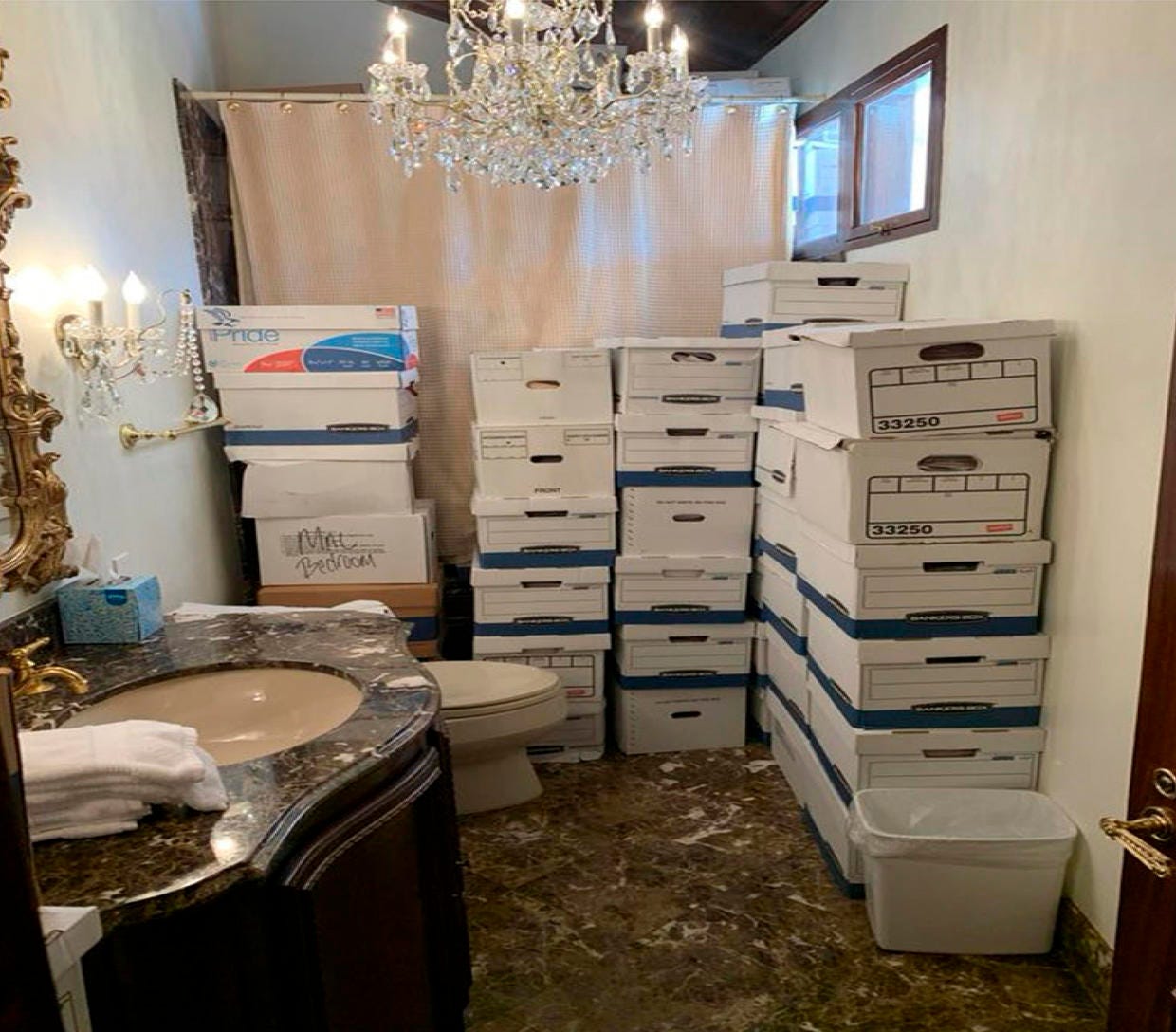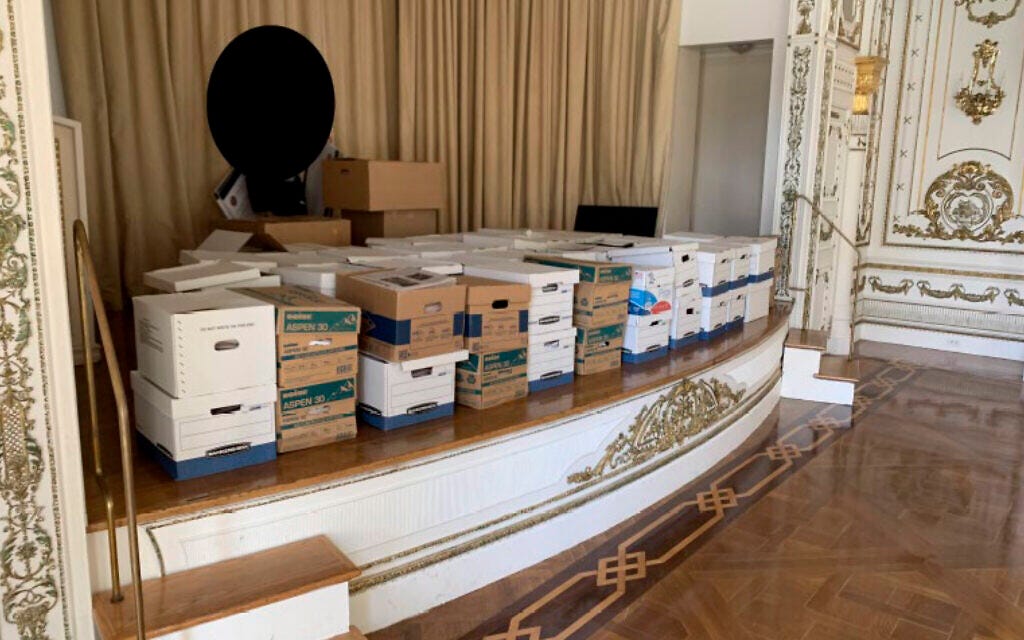Happy Friday, everyone! Class 11 of my Foreign Influence Operations course will be posted Monday. I am putting aside Russia (for now) and will explore how some other countries are corrupting our democracies. If you haven’t signed up already, what are you waiting for? It is designed to do at your own pace, so it’s never too late to sign up!
ALEX’S WEEKLY RANT
As everybody surely knows by now, Donald Trump was indicted this week under the Espionage Act for willful retention of national defense information and obstruction of justice. I highly recommend you read the entire indictment, which is simple and straightforward. Its allegations are damning.
Among those are allegations that Trump stored classified documents in a bathroom and shower. This is a bad idea. Yes, it’s a great place to read documents, but not so much to store them. Bathrooms (and especially showers!) tend to be humid. And while I wouldn’t automatically assume that Trump (or any guests to this particular bathroom) follow normal hygiene rules and wash their hands after going to the bathroom, there is still a risk of documents getting flung with drops of water or simply mishandled and used as hand towels, which would be really bad for the person hoping to dry their hands. Document paper just isn’t that absorbent.
Furthermore, Trump’s former chief of staff, John Kelly, told the Washington Post that, for all his bravado, Trump is “scared shitless.” Begging the question: then why does he have so much paper in his bathroom??
Trump also stored lots of boxes of documents on a ballroom stage. This is also a bad idea. Generally speaking, stages are meant to attract attention. Spectacles take place on stages. When something is on a stage, the idea is: you’re supposed to look at it. That’s not great if your boxes contain classified documents that the majority of people on Earth are not meant to look at.
This next section is for classification geeks.
Don’t be fooled by the “I can declassify whatever I want” argument. For one thing, the indictment offers proof that Trump knew the documents he kept and was showing to people were classified. For another, no, he can’t declassify anything he pleases.
Several of the documents found at his properties were classified under the Atomic Energy Act, meaning they are classified by statute and cannot be declassified by the will of the president alone. They can only be declassified through a process conducted by both the Department of Energy (which is the steward of the US nuclear program) and the Department of Defense (which would use those weapons). Even as president, Trump could not have declassified those documents without going through a declassification process.
If you’re interested in the nitty gritty details about classification and the law, I highly recommend this article written by
and published in Lawfareblog (whose editor in chief is ).What does this mean for national security?
Given my background in intelligence, JustSecurity asked for my insight into the national security implications of these types of documents just laying around and serving as placemats at the Mar-a-Lago buffet. I recommend reading that entire article, as well. But I’ll repeat my comments here:
The indictment’s list of documents raises a number of national security issues.
Only a portion of the documents recovered are actually being used in the indictment. These are documents that the originating agency concluded could be declassified (or declassified enough for a trial) without causing too much damage. But we need to remember the FBI found many more documents that are not included in this list and are probably even more sensitive.
That said, the list in the indictment is bad enough. It includes documents marked “HCS,” meaning the intelligence is derived from human sources. Likely, the documents contain some kind of descriptor of the source (whether the source had first-hand access to the information, for example), which, while generic, can narrow down the possibilities about who is providing the information.
Given my time working with Human Intelligence (HUMINT), it is these HUMINT Control System (HCS) documents that enrage me the most. Sources and U.S.intelligence officers take great risks to get this kind of intelligence and make an enormous effort to make sure the source and the intelligence officer remain safe. Trump disregarded all of that, which would be bad enough for a private citizen, but is even worse coming from a former commander in chief.
The other markings on the documents include imagery, signals intelligence, and nuclear secrets. They include plans and intentions of foreign countries, but also of the United States, which means anyone with access would know U.S. capabilities or lack thereof.
Who had access? These documents were just stacked all around Mar-a-Lago, on ballroom stages and in bathrooms. We know foreign spies have tried to gain access to Mar-a-Lago, and it seems it would be an easy target. Again, the intelligence community goes to great lengths to keep this kind of intelligence secure. It isn’t meant for foreign eyes, nor is it meant for regular folks to grab a quick read about nuclear secrets before heading to the omelet bar.
If Trump is this reckless and cavalier with national security secrets now, imagine how he was when he was president and had access to even more. How much did he share with Russian President Vladimir Putin, Chinese Leader Xi Jinping, Saudi Arabian Crown Prince Mohammed bin Salman, or a random golfer at Mar-a-Lago with zero care about the consequences, as if the secrets are just an accessory to show off to people?
THE WEEK’S LINKS
A roundup of stories you should be reading
RUSSIA
Australia blocks new Russian embassy near parliament (Yahoo!news)
Russia moves to seize ‘naughty’ western companies (FT)
France exposes mega Russian disinformation campaign (Politico)
CHINA
Court Papers Open Rare Window Into Role of Graft in China’s Overseas Lending (WSJ)
YOUR FEEL-GOOD STORY OF THE WEEK
Harvard Medical School Morgue Manager Sold Body Parts, U.S. Says (NYTimes)
Alex Finley is a former officer of the CIA’s Directorate of Operations, where she served in West Africa and Europe. She writes and teaches about terrorism, disinformation / covert influence, and oligarch yachts. Her writing has appeared in Slate, Reductress, Funny or Die, POLITICO, The Center for Public Integrity, and other publications. She has spoken to the BBC, MSNBC, CNN, C-SPAN’s Washington Journal, France24, and numerous other media outlets. She was also invited once to speak at Harvard, which she now tells everyone within the first ten seconds of meeting them. She is the author of the Victor Caro series, satirical novels about the CIA. Before joining the CIA, Alex was a journalist, covering Capitol Hill, the Pentagon, and the Department of Energy. She reported on issues related to national security, intelligence, and homeland security. Did she mention she was invited to speak at Harvard?







Thank you for chiming in on this topic, I immediately thought of your book "Viktor in Trouble" which, after reading last year, clued me in on the asset risks the careless and flagrant abuse of these documents presents.